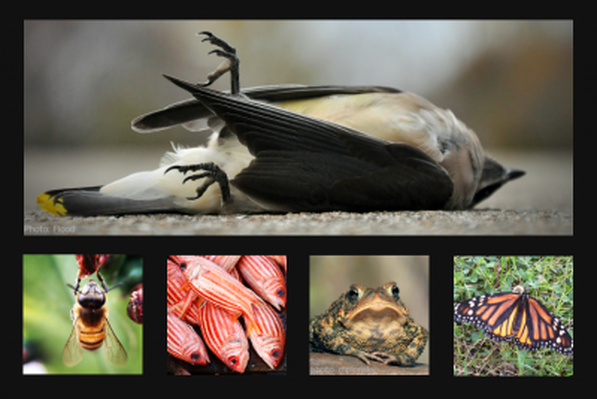Popcorn's Dirty Secret" won the 2015 Digital Edge award!
It’s no secret we love popcorn. We Americans consume more than 16 billion quarts of popcorn each year. But we’re getting more than we bargained for in all those bowls of popcorn: bee-toxic pesticides.
Bees are dying at alarming rates, and scientists have identified a group of insecticides called neonicotinoids (“neonics”) as a prime culprit in these drastic population losses. The largest single use of neonicotinoids is as a seed coating for field crops (like corn, soy, canola, and wheat). In fact, researchers estimate that 95-99% of all field corn grown in the U.S. comes from seed coated with bee-toxic neonic chemicals.
Neonics are the most widely used insecticides in the world. What makes them different from most pesticides is that they are systemic chemicals, meaning they are dispersed throughout the treated plant, rendering the whole plant toxic. Just as alarming, neonics are shown to last in the environment for years, harming species that the chemical was not designed to kill – like bees, butterflies, birds, and other helpful insects.
Unfortunately, the popcorn industry uses bee-killing chemicals on their seeds, too. That’s why we’re calling on Pop Secret, one of the biggest brands in the industry, to urge them to source their popcorn from seeds that are NOT coated in these harmful chemicals.
Pop Secret would not be alone in taking action against neonics:
- Pop Weaver has already agreed to a phase-out of neonics.
- To date, more than 4 million Americans have called on the government to take stronger actions to protect bees from toxic pesticides like neonicotinoids.
- The U.S. Fish and Wildlife Service will implement a ban on neonicotinoid insecticides on all wildlife refuges nationwide by January 2016.
- The European Union instituted a moratorium on the most toxic uses of neonicotinoids.
- The Province of Ontario, Canada has announced plans to reduce the number of acres planted with neonicotinoid-coated corn and soybean seeds by 80 percent by 2017.
- Although it is currently difficult to obtain non-coated seeds in the U.S., growers in Canada requested and received non-treated seed, proving that it is possible to diversify the seed supply with non-coated options when companies and growers are willing to demand it.
- Given the countless risks, lack of benefits, and widespread consumer demand for pollinator protection, it’s time for Pop Secret to join Pop Weaver and commit to phasing out the use of neonic-coated seeds for their popcorn. Mythbusting and True Cost
- Learn more about the insidious nature of neonics and what you can do; take action here: pollinatorsandyourplate.org
The American Bird Conservancy reports that "a single corn kernel coated with a neonicotinoud can kill a songbird", and the Center for Food Safety reports that they are polluting our water systems too.


 RSS Feed
RSS Feed
